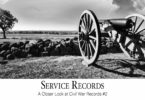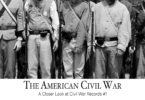The pension records generated by the Civil War are some of the most popular Civil War records among genealogists, and for good reason. These are the records will you will find personal details of an individual or their family that might not exist anywhere else. Pension records are definitely the most personal of the Civil War records. You will definitely want to make use of them in your own research.
Like other Civil War records, pension records can be found online on Fold3 and Ancestry.com, and also at the National Archives in Washington, D.C. Sometimes, different versions of them can be found at state archives, as well. These records come in two primary forms… pension records from actual Civil War veterans, and pension records from the widows of veterans. Less often, you may find the pension record of a soldier who did not marry or outlive his parents, and his parents filed a pension request on his behalf, to help support them in their elderly ages.
After the war, most people who had fought in it, or their loved ones who they left behind, wanted to get that pension money. For widows, elderly parents, and orphaned children, it was important to receive the pension money as soon after the war as possible, so they did not risk becoming impoverished without the income the soldier would have provided when he came home from the war. With the veterans themselves, they usually waited until they were elderly to apply for a pension, as they could work to earn a living until then. The exception was if they had been disabled in any way while serving in the war, in a way that impacted their ability to earn a living. Then, they may have applied for a pension sooner.
Union soldiers and their widows, parents, and orphans were eligible for pensions from the government right away after the war. Confederate soldiers often qualified for pensions from their states right away (so, be sure to check the state archives buildings for these records), but did not become eligible for pensions from the federal government until the late 1800s to early 1900s, depending on their state.
People who applied for pensions, be they veterans or dependents, had to prove certain things, such as dates of birth, dates of marriage, their actual service (including the fact that they didn’t desert), and the date they crossed over. If they were disabled by the war or old age, they had to prove that, too. This meant that applicants submitted corroborating documents, and these are included in the pension files. If such documents did not exist, they brought in witnesses to testify to these dates and facts on their behalf, and also made testaments relying on their own memories. These accounts are also included in pension records, and can be quite personal and detailed in nature. These personal accounts are always wonderful additions to family history research.




